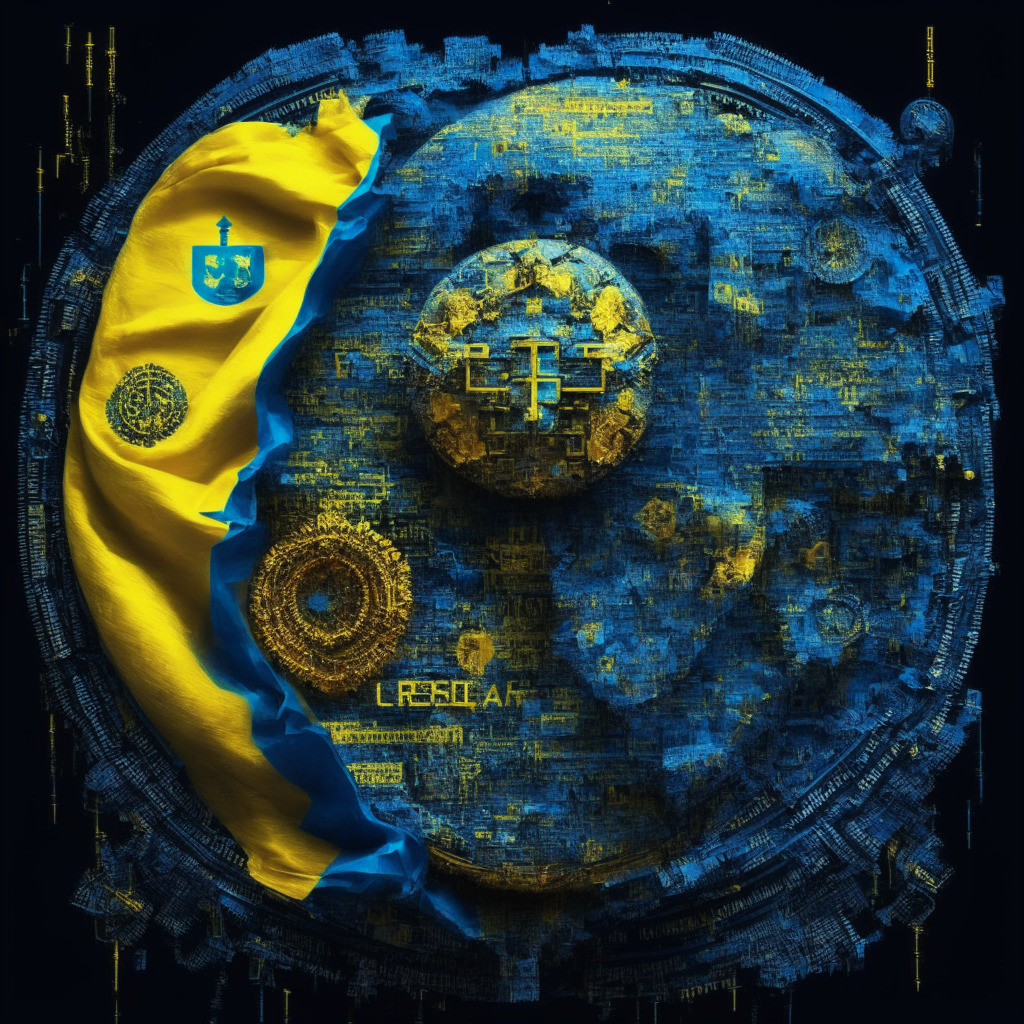Anthropic, led by former OpenAI researchers, is developing an AI chatbot called Claude that aims to differentiate between good and evil with minimal human intervention. Informed by ethical guidelines like the Universal Declaration of Human Rights, Claude manages over 100,000 tokens of information for complex conversations and tackles the ethical challenges faced by AI.
Search Results for: AUD
French Bank Raid Exposes Flaws: How Blockchain Can Alleviate Fraud and Tax Evasion
The French fraud and money laundering case involving major banks highlights the challenges of determining shareholders responsible for paying taxes on dividends. Blockchain technology could offer a solution, providing a transparent, verifiable, and immutable single source of truth for capital markets, streamlining operations, reducing fraud, and enhancing trust and regulation.
RAC’s CULT Pass: Merging Web3, AI & NFTs to Connect Artists and Audiences
RAC has collaborated with HIFI Labs to launch the CULT Pass, a dynamic NFT membership pass with visuals by artist Andres Reisinger and audio by RAC. This innovative project combines Web3 and AI to explore the possibilities of building a deeper connection between artists and audiences, providing ownership of the community and creating immersive membership experiences.
SEC Crackdown on Crypto Fraud: Protecting Investors or Stifling Innovation?
The SEC has targeted fraudulent websites offering high returns on crypto-related investments, aiming to eliminate bad actors in the industry. However, critics argue that the broad enforcement approach hurts legitimate businesses and could stifle innovation and growth in the crypto sector.
IRS and Ukraine Tackle Crypto Fraud: Balancing Innovation and Market Integrity
The IRS partners with the Ukrainian government to tackle cryptocurrency fraud globally, focusing on Russian individuals suspected of evading sanctions. They will provide training on tracing blockchain transactions for Ukrainian officials using a tool developed by Chainalysis. This increased scrutiny raises concerns for the crypto industry, but Brian Armstrong, Coinbase CEO, argues that blockchain’s transparency deters illicit activities.
Exploring Offline CBDC Payments: Balancing Privacy, Fraud, and Accessibility
The Bank for International Settlements (BIS) explores offline central bank digital currency (CBDC) payments and their potential risks, including counterfeit threats and privacy issues, in a collaborative project with Consult Hyperion. The BIS emphasizes the importance of interoperability, risk management systems, and collaboration between public and private sectors for secure and reliable digital currency environments.
Rise of PEPE Memecoin: Attracting Investors and Fraudsters Alike
As PEPE memecoin’s popularity grows, security firms have observed a rise in scams and fraudulent activities involving meme coins. Investors must be cautious, distinguishing between genuine opportunities and scams, while remaining vigilant as the crypto market continues to expand.
Kraken’s Scam Baiting Strategy: A Creative Tactic to Protect Investors & Expose Fraudsters
The US crypto exchange Kraken combats online scammers through “scam baiting,” involving a fake cryptocurrency account with a sizable balance to lure and expose scammers. This innovative approach highlights the importance of robust security measures, investor fund protection, and maintaining trust in the crypto industry.
South Korean CEO’s $176M Crypto Freeze: Fraud Allegations and Heaviest Financial Crime Sentence
South Korean prosecutors freeze $176 million in assets belonging to Terraform Labs CEO Kwon Do-Hyung over alleged investor fraud in Terra-Luna project and related DeFi services, as he faces a court hearing for travel document forgery charges. This highlights South Korean authorities’ crackdown on white-collar crimes.
Exploring Privacy and Fraud Prevention in Central Bank Digital Currencies (CBDCs)
Central Bank Digital Currencies (CBDCs) are gaining traction as a promising solution for financial institutions worldwide. Quant, a UK-based company, is working on CBDC development, focusing on privacy while upholding Anti-Money Laundering (AML) and Know Your Customer (KYC) measures. Collaborating with the Bank of England, the potential digital pound aims to address fraud and financial crime effectively while balancing privacy concerns.
FTX Founder Faces Criminal Charges: Market Collapse or Fraud to Blame?
Sam Bankman-Fried, founder of the defunct cryptocurrency exchange FTX, faces 13 criminal charges including money laundering and wire fraud. His defense seeks dismissal of ten charges, alleging legal shortcomings and extradition process violations. The case’s outcome may impact future cryptocurrency industry regulations and investor enthusiasm.
AI-Generated Music on Spotify: Fraud Concerns vs Creative Exploration
Spotify removes 7% of AI-generated music by startup Boomy amid concerns of fraudulent activity and copyright issues. While the industry is apprehensive about the technology, some artists are eager to explore its potential. This conflict may shape AI’s future role in the music industry.
Legislation Impact: Will Crypto Firms Refunding Fraud Victims Boost Investor Confidence?
The New York Attorney General’s Office has proposed legislation to protect cryptocurrency investors from fraudulent activities by requiring crypto companies to adhere to specific standards and offer refunds to victims. This aims to increase consumer confidence and adoption of digital currencies.
Ex-OpenSea Executive’s Fraud Case: Impact on Trust in Blockchain and Crypto Markets
The crypto community is shocked as ex-OpenSea executive Nathaniel Chastain is convicted for wire fraud and money laundering in the first-ever insider trading scheme involving digital assets. This incident raises concerns about the vulnerability of the crypto marketplace to illegal activities, highlighting the need for improved safety measures, regulations, and scrutiny.
UK’s War on Crypto Fraud: Balancing Innovation and Investor Protection
The UK government plans to ban cold calls related to insurance and cryptocurrencies, employing 400 new staff and new anti-spoofing equipment to tackle £7 billion annual fraud costs. The Financial Conduct Authority faces challenges balancing investor protection and nurturing innovation in the crypto industry.
UK’s Battle Against Crypto Fraud: Striking the Balance Between Regulation and Innovation
The UK government is cracking down on financial fraud, including cryptocurrency schemes, amidst a surge in crime costing £7 billion annually. Proposed measures include the Economic Crime and Corporate Transparency Bill, empowering law enforcement to seize illicitly-used crypto assets, and potentially banning cold calls marketing financial products. Policymaker’s challenge lies in protecting investors while nurturing a compliant, innovative digital asset market.
UK’s Battle Against Fraud: Impact on Crypto Market and Striking the Innovation-Security Balance
The UK government plans to stop cold calls selling financial products, including insurance and cryptocurrencies, to tackle £7 billion in annual fraud costs. By collaborating with The Office of Communications (Ofcom), the focus is on countering phone number “spoofing,” while balancing security and fostering innovation within the crypto industry.
Johann Steynberg Case: Largest Bitcoin Fraud & the Challenge of Victim Compensation
The U.S. Federal Court has ordered Mirror Trading International CEO, Johann Steynberg, to pay $1.73 billion in restitution and a civil monetary penalty for his Bitcoin Ponzi scheme. The case, labeled the “largest fraudulent scheme involving Bitcoin” by the Commodity Futures Trading Commission, emphasizes the need for regulatory compliance and investor protection in the crypto market to prevent future scams and recover lost funds.
Unravelling the Shadows: FTX Collapse Focused on Legal Professional Involvement
The collapse of FTX exchange puts the spotlight on the role of lawyers facilitating loans to co-founder, Gary Wang. Claims are made on a potential $8bn shortfall prior to FTX’s collapse. Investigations into these claims, Wang’s and former Alameda CEO Caroline Ellison’s role in possible conspiracy and fraud are ongoing, packed with legal intricacies and complex crypto-law conundrums.
Balancing Act: Choosing the Right Consensus Mechanism for Your Blockchain Project
“Choosing a consensus mechanism for a blockchain project is complex and multifaceted, involving the balancing of security, sustainability, scalability, regional preferences, and long-term project goals. The decision requires understanding and navigating through various project-specific details and an ever-evolving technology landscape.”
Cyprus’ Crackdown on Unregistered CSPs, Zimbabwe’s Gold-Backed Tokens &Crypto Follies in China
“Cyprus is tightening regulations on Cryptocurrency Service Providers, aligning with international standards and penalties. In Zimbabwe, gold-backed digital tokens are becoming a domestic transaction method with value ensured by national gold reserves. Despite advancements, crypto fraud remains a pressing concern; investors must exercise caution.”
Examining the Ongoing Legal Battle Involving FTX Co-Founder: Unraveling the Knotted Crypto World
The legal team of Sam Bankman-Fried, facing trial in a complex crypto case, is questioning the understanding of borrowings from FTX co-founder Gary Wang. Accused of masking funds for personal use, Bankman-Fried’s defense claims Wang believed his actions legal, backed by professional advice. The ties between FTX and Alameda Research, a key point in the lawsuit, have thrown light on unclear blockchain regulations and ambiguous areas in crypto dealing.
The Fall of FTX’s Sam Bankman-Fried: A Cautionary Tale or Web3 Symbol’s Downfall?
Cardano’s Charles Hoskinson compared FTX’s co-founder, Sam Bankman-Fried, to Ponzi scheme operator Bernie Madoff, criticizing his lenient media treatment. Following the FTX crash, allegations of misappropriation of user assets and extravagant purchases surfaced, leading to calls for stringent regulation in the crypto industry.
Sam Bankman-Fried Trial Potentially Overhauls Crypto Legal Landscape: A Detailed Analysis
The ongoing trial of crypto bigwig Sam Bankman-Fried could significantly shape the cryptocurrency legal landscape. The defense is focusing on minute details, potentially laying groundwork for a later appeal. The case’s outcome may influence future regulations of blockchain-based businesses.
The Great FTX Crypto Exchange Debacle: Unchecked Power or Deliberate Scam?
“The FTX debacle shed light on the murkiness of crypto regulations following accusations made against the former CEO, Sam Bankman-Fried. Charles Hoskinson, Cardano’s founder, raised concerns over the media’s leniency towards Bankman-Fried, comparing him to Bernie Madoff. This case emphasizes the need for transparent and accountable media and robust crypto regulations.”
A Leap or A Slip? The $1.6 Million CrypToadz NFT Purchase: A Breeding Ground for Wash Trading?
A CrypToadz NFT, normally under $1000, was bought for about $1.6 million, leading to questions about its legitimacy. The indicators point towards potential wash trading, involving a chain of transactions for liquidating dubious funds. This episode underscores the need for vigilance in the evolving cryptocurrency and NFT markets.
Reeling from Scams: Challenges to Crypto Safety in Hong Kong Amidst Web3 Era
The Hong Kong crypto community was victim to a costly phishing scam, with fraudsters impersonating Binance and swindling users out of more than $450,000. Amid rising technology crimes, the local police, through its CyberDefender program, are emphasizing prevention and education about risks associated with the digital universe.
Blockchain Blemishes: South American Cybercrime Investigation Unravels Crypto’s Double-Edged Sword
“This story embodies the complexities of the blockchain era: a vortex of opportunities and challenges swirling together. Secure online transactions and financial autonomy are laudable, but the obfuscation and veil of anonymity may inadvertently shield devious individuals, unfurling a global chase through digital footprints across international borders.”
Binance Scam in Hong Kong: A $450K Lesson in Crypto-Security Vulnerabilities
“Despite the security prowess that blockchain technology is renowned for, a recent wave of cyber-crime caused 11 Binance users in Hong Kong to lose over $446k. This demonstrates the ongoing struggle between the technology’s versatility and inherent vulnerabilities, highlighting shortcomings in existing security frameworks and the urgent need for comprehensive solutions.”
Crypto Website Breach: Steering Through Chaos, Learning From Ordswap’s Experience
“Ordswap, a Bitcoin Ordinals marketplace, temporarily lost control of its domain, redirecting users to phishing links. The issue wasn’t Ordswap’s fault, but attributed to their hosting firm, Netlify. During this, Ordswap took quick steps to help users recover their private keys and secure their assets.”
Navigating Cyber Threats in Crypto: FTX Hack and Safety Measures in a Bankman-Fried World
“The FTX hack saw over $400 million siphoned off from FTX’s coffers, coinciding with Sam Bankman-Fried’s high-profile trial, potentially providing cover for such illicit activities. These unexpected breaches in security have signaled the need for the evolving and relentless vigilance in our industry.”
Smart Contracts on Bitcoin: The Future of Blockchain or an Overreaching Gamble?
The recent “BitVM: Compute Anything on Bitcoin” white paper by ZeroSync’s project lead, Robin Linus, proposes a new way to implement complex off-chain smart contracts on Bitcoin. Based on a Turing Complete system, this method would broaden Bitcoin’s operations to include applications like tactical games verification, bridging BTC to foreign chains, and constructing prediction markets.































